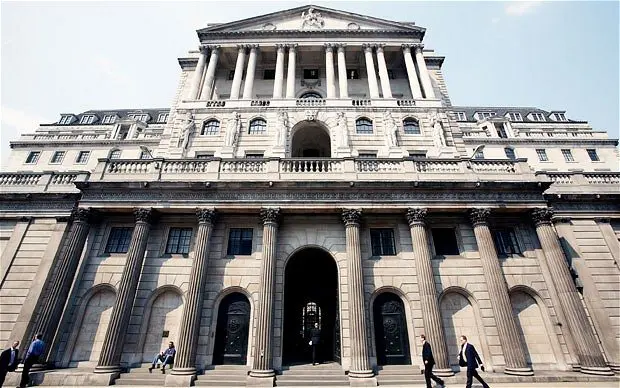Manufacturers are enjoying a “surge” in activity as the recovery takes hold, with output rising to a three-year high, according to a new survey from industry group EEF. The latest PMI survey for the sector should confirm the upswing.
Separately, analyst Hometrack reports that Britain’s property market is enjoying its best conditions since before the financial crisis, with house prices growing at their fastest rate in three years. In line with that, retailers saw a 20pc rise in homewares sales in August, according to accountants BDO.
The further strong economic data puts pressure on the Governor, Mark Carney, as he tries to convince markets that interest rates will stay low until at least mid-2016, as signalled through his new policy of “forward guidance”, reports The Telegraph.
Traders continue to bet that rates will rise in 2015, suggesting that they think unemployment will drop to the 7pc threshold — set out by Mr Carney as needed for a rate move — sooner than predicted, or that inflation will become a bigger worry as the economy picks up pace, likewise forcing his hand.
“As Harold Macmillan commented on the most important factors driving his decisions as Prime Minister: ‘Events, dear boy, events,’ ” Andrew Sentance, a former Monetary Policy Committee (MPC) member, writes in The Daily Telegraph today.
“If the recovery does gather momentum in the UK, events may force the hand of Mark Carney and the MPC, causing interest rates to rise sooner rather than later.”
The Governor and the rest of the MPC are expected to leave policy unchanged at their monthly meeting this week, but the Bank may put out another statement to reinforce its intentions to keep rates low.
Economists on the Institute of Economic Affairs’ so-called Shadow Monetary Policy Committee have criticised Mr Carney’s strategy of forward guidance as “misguided” and based on a “flawed model”, warning it will fuel inflation and lead to boom-and-bust cycles.
In a further blow, Gerard Lyons, a noted City economist, said yesterday that “forward guidance is feeding a housing bubble in London and may [be] resurrecting leverage and parts of the shadow banking world as well”.
However, he also said critics of the strategy appeared to be overlooking the fact that the economy remains weak and confidence is only now starting to rise.
Even so, a stronger domestic market is driving a rebound for manufacturers, says EEF, with the balance of companies seeing higher output in the past three months reaching 32pc, a three-year high.
An improvement in orders was broad-based rather than confined to certain sub-sectors, the first time this has happened for over a year.
Researchers were also cheered as firms, particularly small and medium businesses, showed the strongest levels of intention to invest in the survey’s history.
Today’s manufacturing PMI is expected to show activity in the sector continues to grow.
“Prospects have brightened considerably in the past few months,” said Lee Hopley, EEF’s chief economist. “There is growing confidence that improving trading conditions will continue into the final months of this year and then accelerate through the gears in 2014.”
House prices rose a further 0.4pc month-on-month in August, or 1.8pc on a year ago — the biggest yearly rise for more than three years, Hometrack said.
Richard Donnell, its director of research, said: “All the key market indicators such as time on market and the proportion of the asking price achieved show underlying housing market conditions are at levels not seen for six years.”


